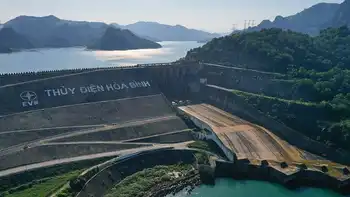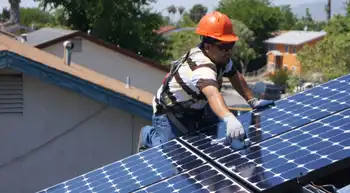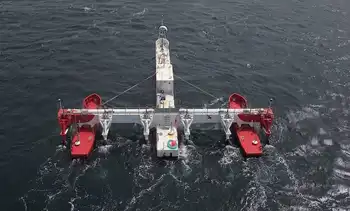Gas plant developers fight TrAIL transmission line
By Charleston Gazette
Protective Relay Training - Basic
Our customized live online or in‑person group training can be delivered to your staff at your location.

- Live Online
- 12 hours Instructor-led
- Group Training Available
Competitive Power Ventures Inc. argues that its plants would eliminate the need for the 500-kilovolt transmission line to ship more coal-fired power from Appalachia to Washington, D.C., and its growing suburbs.
One of CPV's projects, CPV Warren LLC, has intervened in a pending West Virginia Public Service Commission review of the Trans-Allegheny Interstate Line, or TrAIL.
CPV Warren proposes to build a 600-megawatt gas-fired plant in Warren County, Va. A sister company proposes a similar 640-megawatt plant in Charles County, Md. Both plants are expected to be in operation by 2011.
Reports from CPV Warren experts, filed with the PSC, conclude the gas-fired plants are a better solution to electrical reliability problems identified by PJM Interconnections, a private organization that maintains the regional power grid.
"If the generation resource cap is in the East, build generation resources, such as CPV Warren, in the East, not a massive transmission line such as the one proposed here to support the delivery of power and energy from existing and proposed generation in the West," George C. Loehr, a consultant for CPV Warren, said in prepared testimony filed with the PSC.
Debate over CPV Warren's arguments was among the issues focused on as the PSC began formal evidentiary hearings on the 240-mile transmission line that would carry electricity from western Pennsylvania across West Virginia and into Virginia.
Allegheny Energy wants the PSC to approve the 114 miles of the line that run through West Virginia. TrAIL would enter the state north of Morgantown and run south and east through Monongalia, Preston and Tucker counties to Mount Storm in Grant County. Then it would turn east through Hardy and Hampshire counties before entering Virginia.
Allegheny officials say the line is needed to provide cheap and reliable power to big Eastern cities and their growing suburbs. Aging infrastructure, combined with increasing power demand, could cause rolling blackouts by 2011 that would extend into eastern West Virginia, power company officials say.
The project has drawn intense opposition from hundreds of West Virginians, who fear it will mar scenic views, lower their property values and otherwise damage rural communities.
Among other opponents, the Sierra Club has intervened to fight TrAIL, arguing that increasing coal-fired power would make the climate-change problem worse. "At a time when the overriding need, nationally and internationally, is to reduce emissions of carbon dioxide the case for any proposed increase must face an overwhelming burden of proof," the Sierra Club said in a prepared opening statement. "Such an evidentiary showing could never be sustained where the purported electric objective - increase net supplies of electricity in the target market - can be achieved by available regulatory tools in the target market that will, incidentally, achieve the desired objective and reduce, not increase, carbon dioxide emissions."
In deciding the case, commissioners must decide whether the power line will "economically, adequately and reliably contribute to meeting the present and anticipated requirements for electric power of the customers served" and whether it is "desirable for present and anticipated reliability of service for electric power for its service area or region."
The PSC also must decide whether the project "will result in an acceptable balance between reasonable power needs and reasonable environmental factors."
The PSC already held a series of public-comment periods last year, and set aside 10 days in January - including several Saturday sessions - and four days in February for formal testimony.
A ruling is not expected until late April or early May.
The TrAIL project is the first of two new major transmission lines that the PSC is expected to be asked to approve in West Virginia over the next few years.
American Electric Power wants to build a 765-kilovolt transmission line from the John Amos Power Station near St. Albans to a substation northeast of Martinsburg.
That 250-mile project is part of a $3 billion, 550-mile line that would run to New Jersey. AEP calls that proposal PATH, for Potomac-Appalachian Transmission Highline.
During the opening hearings on TrAIL, CPV Warren lawyer Michael Engleman spent several hours grilling PJM Vice President Steven Herling about his organization's backing of the power line.
Herling testified that PJM did not include the two CPV gas-fired plants in its projects when it modeled electrical reliability for studies that supported building TrAIL. In particular, Herling testified that PJM wasn't certain that the Warren County plant would ever be built.
"That project is not far enough along in the process," Herling said. "Until we see a higher degree of certainty from a generator, I can't gamble our reliability on press releases."
In response to questions from PSC consumer advocate Billy Jack Gregg, Herling said he wasn't sure the CPV Warren plant was big enough to really make a difference.
"I don't believe a unit of that size will resolve all of the violations we have identified," Herling said. "But we have not done a comprehensive study of that unit."
In prepared testimony, CPV Warren expert James Bouford said he modeled the transmission system with the CPV Warren plant in operation as of 2011. Together with what CPV Warren called "minor tweaks" in the transmission system, that plant made the TrAIL line unnecessary, the testimony said.











